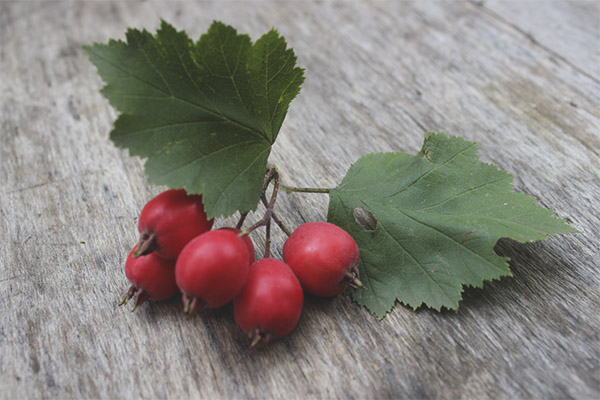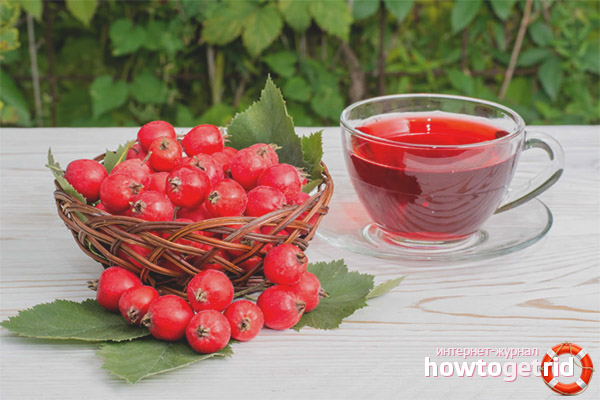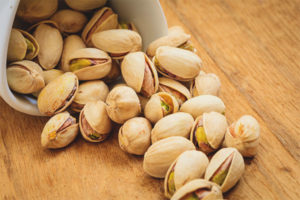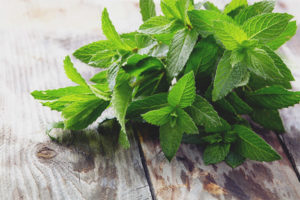The content of the article
Herbal medicine is a salvation for future mothers. Due to the healing properties of plants, it is possible to achieve a therapeutic effect without the need for the use of synthetic drugs.
Among useful plants, hawthorn or blackthorn, which grows everywhere in the steppes of the CIS countries, has earned recognition. The local population is pre-stocked with inflorescences and bushes of berries in order to carry out treatment throughout the year.
If for the first time you want to try the berries during pregnancy, then you need to familiarize yourself with both useful and harmful properties, so as not to harm yourself and your baby.
Chemical composition
The composition of hawthorn atypical for most shrub fruits. It contains rare elements in significant quantities, thereby encompassing the most diverse areas of traditional medicine.Valuable berries, seeds and inflorescences contain:
- mono- and polysaccharides (up to 11% of the total mass);
- fatty acids and oils;
- organic acids (citric, caffeic, tartaric, chlorogenic);
- glycosides (saponaretin, vitexin, orlentin, amygdalin);
- tanning components;
- phytosterols;
- pectins;
- phenol carboxylic and triterpenic acids (crazeic, oleanolic, ursolic);
- flavonoids (apigenin, quercetin, gerbacetin, kaempferol, and others);
- vitamins of group A. K, E, C, B;
- acetylcholine and trimethylcholine;
- essential oils;
- saponins;
- sorbitol;
- starch;
- macro- and microelements (iron, aluminum, zinc, copper and others).
The composition is very rare, so the hawthorn berries can not be replaced by some other. The fruits act as an active biological additive and a complex of multivitamins, which allows you to saturate the body with a maximum of nutrients and ensure their full absorption.
With a huge range of useful components, the caloric content of fruits remains negligible - only 52 kcal per 100 g of product.
Thanks to phenol carbonic and triterpenic acids, hawthorn has a mild sedative and calming effect on the nervous system of mother and baby.Also, these components dilate blood vessels, reducing blood pressure and ensuring normal blood flow to the internal organs.
The benefits of hawthorn in pregnancy
For the future mother, not only the fruits of the shrub are valuable, but also the seeds inside them and the inflorescences. By combining these components of the plant, positive results can be achieved.
- Get rid of edema. In the later periods, limbs can swell dramatically. Excess water is retained in the body and leads to a deterioration of health. A decoction of hawthorn has a diuretic effect, well removes excess fluid and reduces swelling. Due to this effect, the kidneys are discharged, cleaned of toxins, poisons, salts of heavy metals and other harmful components.
- Strengthen the heart muscle. The heart already in the second trimester actively pumps blood through the additional (placental) circle, as a result of which the load on the entire cardiovascular system increases. Fruits and inflorescences gently stimulate muscle function, effectively clean vessels of cholesterol and atherosclerotic plaques, strengthen and tone up their walls.Due to the regular use of the plant, the pressure remains stable, the risk of hypertensive states, such as preeclampsia and hypertensive crises, is reduced. Also, berries produce prevention of cardiovascular pathologies (cardiac arrhythmias, insufficiency, angioneurosis, heart attack, atherosclerosis, thrombosis, embolism, thrombophlebitis, etc.).
- Protect the liver. Hawthorn active substances stimulate the regeneration of liver cells, remove waste, toxins and metabolites, and heal the organ.
- Strengthen the central nervous system. Traditional medicine actively uses the plant to eliminate the excitability of the nervous system. The future mother often notes mood swings, irritability and nervousness, increased anxiety, apathy and stress. Herbal teas with hawthorn soothe the central nervous system, restore normal cerebral circulation, thereby eliminating oxygen starvation. Thanks to these effects, attention and coordination are improved, productivity increases, and chronic fatigue disappears. Before giving birth, such prophylaxis makes it easier to endure contractions and not to panic.
- Eliminate headaches. Because of high blood pressure and anxiety, pregnant women often complain of headaches and migraines. Hawthorn acts as a mild antispasmodic, reducing seizure power and reducing their number.
- Normalize the endocrine system. The components of the berries strengthen the pancreas, thyroid and sex glands, stabilize the secretion of hormones important for the maintenance of pregnancy.
- Adjust plasma glucose levels. Often, pregnant women develop gestational diabetes - an increased level of sugar in the blood, which leads to a deterioration of health and a number of associated symptoms. Natural hawthorn allows you to daily reduce the concentration of sugar in the blood, preventing the development of complete diabetes.
- Improve digestion. A number of organic acids, vitamins, flavonoids and other useful components heals the digestive tract, regulates the acidity of the stomach, facilitates absorption, stimulates the production of enzymes. The components also improve motility, allowing you to prevent problems with emptying (chronic constipation or diarrhea). Organic acids quickly destroy cholesterol cells and lipids, making healthy, gradual weight loss possible.
- Ensure a healthy sleep. Due to its mild sedative effect, hawthorn facilitates falling asleep, ensures long and deep sleep. Teas and decoctions are used to treat insomnia and other sleep disorders.
- Improve the look. Pregnant women often complain of deterioration of the skin: rashes, dryness, pale complexion, lack of tone. Masks and creams with hawthorn berries increase the elasticity of the skin, improve blood flow to the epidermis, stimulate its regeneration, prevent the occurrence of stretch marks. Ursulic acid in the composition of the berries is also a component of collagen, thereby providing smoothing of fine wrinkles, the appearance of a healthy blush, general skin rejuvenation.
- Prevent anemia. Shrub berries contain iron, which provides the production of red blood cells (erythrocytes), as well as hemoglobin - a component that carries oxygen to the cells. The lack of these substances can lead to iron deficiency anemia (anemia), which often happens during pregnancy.
- Strengthen immunity. Ascorbic acid and antioxidants allow you to fight free radicals and pathogenic microflora,reducing symptoms of diseases and allergic reactions.
How to apply hawthorn during pregnancy
As mentioned above, various parts of the plant (flowers, leaves, berries, etc.) are suitable for treatment. After collecting the components must be dried on the newspaper, avoiding direct sunlight.
The resulting raw material is stored in glass jars, paper or cloth bags. Avoid condensation in storage tanks. Also place the container with raw materials in a dry and dark room, closed from insects and rodents. Remember that the leaves and inflorescences of hawthorn store about a year, and the fruits up to 2 years.
From all components you can prepare medicinal teas and decoctions. It is necessary to consume this drink before meals (three times a day) in a volume of 50 ml.
Doctors and nutritionists recommend eating berries fresh or after defrosting. Fruits fray with sugar or added to salads. Dry berries can be ground into flour and added to pastries, honey and cream fillings. Compote brewed from hawthorn dried fruit is very useful (about 15 berries per three liters of water).
But in the form of alcohol tincture, hawthorn is prohibited during pregnancy and lactation.
Limitations and contraindications
The abuse of seemingly useful berries can cause side effects in the expectant mother:
- idiosyncrasy in the form of allergies or indigestion;
- severe sleepiness;
- weakness and decrease in concentration, reaction rate;
- heart rhythm disorder;
- a sharp drop in blood pressure;
- increased risk of miscarriage or premature birth.
Doctors are allowed to use a day no more than 2 tablespoons of fruits and inflorescences.
Also, you should not drink broths and teas on an empty stomach, if immediately after this there is no food intake.
Strict contraindications to the use of hawthorn are:
- food allergy to berries or medicinal plants;
- atherosclerosis in the acute stage;
- severe liver and kidney disease;
- hormonal disorders;
- severe stage of toxicosis, including preeclampsia;
- lactation;
Diseases of the cardiovascular system in the acute phase (tachycardia, arrhythmia, history of stroke, stroke, cardiac pacemaker, extrasystole, vascular dystonia, and others).
Hawthorn fruit is an affordable, inexpensive and very valuable tool that is successfully used to treat future mothers.It is thanks to him that pregnant women successfully fight stress and sleep disorders, strengthen the cardiovascular system. Regular use produces the prevention of serious violations and complications of pregnancy, has a positive effect on the formation and development of the embryo.
Video: hawthorn benefits for the body












To send